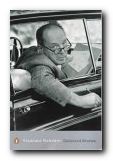a critical examination of Nabokov’s collected stories
 A year later, for what was to be his last short story, he attempted another difficult subject – interplanetary space travel. ‘Lance’ (October 1951) takes as its central issue the idea that the experiences of the first people to travel in space (and time) might possibly be quite overwhelming. The story is presented in five distinct sections by Nabokov in one of his most self-conscious personae as narrator.
A year later, for what was to be his last short story, he attempted another difficult subject – interplanetary space travel. ‘Lance’ (October 1951) takes as its central issue the idea that the experiences of the first people to travel in space (and time) might possibly be quite overwhelming. The story is presented in five distinct sections by Nabokov in one of his most self-conscious personae as narrator.
Part one sweeps away all the clichés of Sci-Fi and space travel stories in a manner which draws the subject of these fictional conventions into the story itself: ‘Another thing I have not the slightest use for is the special equipment business – the air-tight suit, the oxygen apparatus’ (ND,p.205). He pushes even further than before the tongue-in-cheek lecture-room loftiness of his address to the reader: ‘This seems to complete the elimination – unless anyone wants to discuss the question of time?’ (p.207)
Section two introduces Lance the young astronaut and his ageing parents, the Bokes. This is done in a manner which plays jokingly with the fictionality of the account itself – Nabokov pretending in mock-humility that he does not have all the information he might have about his own creations: ‘I am somewhat disappointed that I cannot make out [Mr Boke’s] features’ (p.209). The parents are worried about their son as he departs for his voyage.
Part three describes their anxiety as they watch the stars whilst he is absent – but this description is relayed by Nabokov keeping extremely close hold of the narrative and toying with the extended metaphor comparing the exploration of space with that of mountaineering:
‘Ah, there he is again! Crossing through a notch between two stars; then, very slowly attempting a traverse on a cliff face so sheer, and with such delicate holds that the mere evocation of those groping fingertips and scraping boots fills one with acrophobic nausea’ (p.214)
This is very typical of Nabokov’s later narrative style: the subject is almost hidden beneath word-play, allusions, the rapid switching of subjects and points of view, and even excursions into speculative fancy.
In a short passage near the end of this section he is still describing Lance’s exploration, then switches point of view to wonder how news of his return would be made, quickly sketches in the outline of such a scene, bringing a very minor character to life in doing so, and then cancels it to return to the narrative:
‘There is some routine rock work ahead, and then the summit. The ridge is won. Our losses are heavy. How is one notified? By wire? By registered letter? And who is the executioner – a special messenger or the regular plodding, florid-nosed postman, always a little high (he has troubles of his own)? Sign here. Big thumb. Small cross. Weak pencil. Its dull-violet wood. Return it. The illegible signature of teetering disaster.
But nothing comes. A month passes’ (p.215)
Part four then switches to discuss what Lance’s view of the earth might be from amongst the stars, and since he is full of intelligent imaginative capacity, will his mind survive the shock?
Part five answers this question – but with the sort of understatement and open-endedness which was used in Signs and Symbols. The Bokes are summoned to the hospital where Lance is recuperating. He has changed, says he is going back, and is not allowed to tell his parents what he has seen. The implication is that his mind has not survived the shock, and his parents leave the hospital more quickly than they need to, possibly having realised the truth.
Many might wish to argue that the mode Nabokov adopts here – repeatedly drawing attention to his own existence as narrator and to the fictionality of his construct – a form of mannerism which has become tediously over-used in the fictions and meta-fictions of the last twenty years or more – is not suitable for the purposes of the short story and the demands it makes for impersonal presentation, restraint, and economy. But the tone he adopts is perfectly consistent, his theme is kept in view throughout the story, the dramatic element in the narrative is understated, and the reader is kept amused or busy by the consistently high level of Nabokov’s imaginative ‘digressions’:
‘Terrestrial space loves concealment. The most it yields to the eye is a panoramic view. The horizon closes upon the receding traveller like a trap door in slow motion. For those who remain, any town a day’s journey from here is invisible, whereas you can easily see such transcendencies as, say, a lunar amphitheatre and the shadow cast by its circular ridge’ (p.211)
© Roy Johnson 2005
![]() Vladimir Nabokov: The Collected Stories – Amazon UK
Vladimir Nabokov: The Collected Stories – Amazon UK
![]() Vladimir Nabokov: The Collected Stories – Amazon US
Vladimir Nabokov: The Collected Stories – Amazon US
Vladimir Nabokov web links
Vladimir Nabokov greatest works
Vladimir Nabokov criticism
Vladimir Nabokov life and works